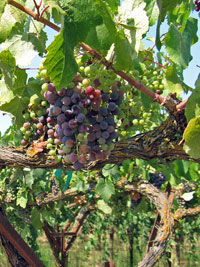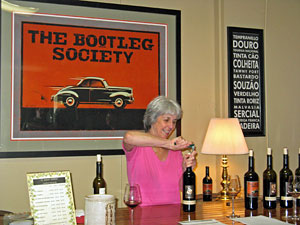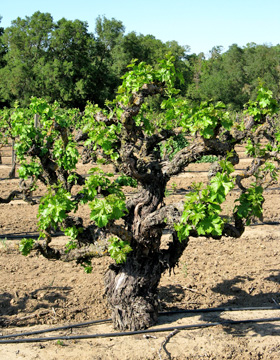I’ve posted a portion of a report on a July day-trip with a couple of friends to several Lodi wineries and tasting rooms. A full report on all of the visits is on the Grape-Nutz.com website:
Lodi - July 2013
Hux Vineyard
St. Amant Winery
Dancing Coyote Wines
St. Jorge Winery

Marzemino grapes at Hux Vineyard
St. Amant Winery
My friends and I decided to make another stop before lunch, and I suggested St. Amant Winery, a place I’d visited on an earlier Grape-Nutz trip in April 2008. I’ve continued to take note of their wines since then, especially at the annual tastings of the Tempranillo Advocates, Producers, and Amigos Society (TAPAS) for wines made from Iberian grape varieties. These wines are a key part of the St. Amant production, but far from the only part.
We arrived at St. Amant shortly after noon. The winery and tasting room are located in a small portion of the enormous old Guild Wines building on the east side of Lodi. This had been the blending, aging, and bottling plant for a group of co-operative producers called the Wine Growers Guild. In the mid-20th Century, Guild Wines was one of the largest wine brands in the country.
St. Amant was founded by Tim and Barbara Spencer, and the winery name comes from Barbara’s maiden name. The Spencers had planted a vineyard in 1972 on their property in the Jackson Valley area of Amador County, about 30 miles northeast of Lodi. This was originally planted to Zinfandel and Sauvignon Blanc, which they sold to local wineries. In 1979 they grafted two acres of their Zin vines over to five Portuguese grape varieties – Touriga, Tinta Cão, Alvarelhão, Bastardo, and Souzão. Their first wine was a traditional Port made from this fruit in 1981, and St. Amant continues to make fine Port-style wines. The Spencers moved their winery from Amador County to Lodi in 1996, though much of their fruit is still sourced from their Amador vineyard, which was replanted in the 1990s due to phylloxera. They also buy Zinfandel and Barbera fruit from Lodi. Tim Spencer passed away in 2006, and the winery is now run by Barbara and their son Stuart. Stuart is a busy guy – he also works with the Lodi-Woodbridge Winegrape Commission and he’s the current TAPAS President as well.
I’d tasted with Stuart during my 2008 visit to St. Amant, but he was out of town this time, and Barbara was behind the small tasting counter. Another group was already there but Barbara welcomed us and made sure we all had plenty of room to taste. I tasted eight current releases, passing on a couple that I’d tasted recently – the “Miss Independent” Verdelho and “The Old Soldier” Touriga, both of which come from the Spencers’ Amador vineyard. Of those two, I particularly liked the lightly floral stone fruit aromas and crisp finish of the Verdelho. We tasted one wine that was specially created for the St. Amant wine club – The Bootleg Society “Speakeasy Red,” a robust red. As we tasted the Zinfandel, Barbara told us that the 2012 Mohr-Fry Ranch bottling she poured for us had just been released. The St. Amant Mohr-Fry Zin is sourced from vines planted in 1944, while their Marian’s Vineyard Zin (the most recent bottling was sold out) comes from a block of Mohr-Fry Ranch that dates to 1901. The Spencers added some Cabernet Sauvignon to their Amador vineyard in 2012, so we may see a St. Amant Cab in the future.

St. Amant’s red wines are typically fermented in both open- and closed-top stainless steel tanks, and aged in both French and American oak. Ports are all made in neutral oak. Their most distinctive Port – the non-vintage Tawny made entirely from Bastardo grapes (a variety known as Trousseau in France) – goes into older barrels and is never topped or racked. We finished our tasting with two St. Amant Ports made from traditional Portuguese grape varieties, and both were very good. We stayed for awhile talking with Barbara after we’d finished tasting – she’s a great source of information on the Lodi area and its wines.
As I’ve found over the years, St. Amant’s wines tend to be more restrained than those from some other Lodi wineries, featuring fine balance and lacking the noticeable sweetness that is present in many wines from the area. The Verdelho, Souzão, Mohr-Fry Zinfandel, and Tawny Port were all standouts but the rest of the wine line-up was not far behind. Barbara and Stuart continue to do a fine job on these wines, and St. Amant remains one of the best Lodi wineries I’ve found.
Current releases
St. Amant 2011 Barbera, “Tools of the Trade,” Lodi. Sourced from a 40-year old vineyard. Medium color, this showed cherry, smoke, spice, and sweet oak aromas. Medium weight on the palate, with lots of characteristic Barbera juicy acidity, and finishing with fairly mild tannins.
St. Amant 2011 Syrah, “The Curmudgeon,” Amador County. Blended with a little Tempranillo and Souzão. Medium purple color, with plum and black pepper on the nose, along with undertones of spice and vanilla/oak. Medium-bodied and lively, with a moderately tannic finish.
St. Amant 2011 Souzão, Amador County. Blended with a little Tempranillo, made mostly in neutral oak. Medium-dark color, displaying aromas of bright raspberry and plum fruit, dried herb/tobacco, black pepper, and earth. Medium-full bodied and structured, with lively acidity and a lingering finish with moderate tannins, nice.
St. Amant 2012 Zinfandel, “Old Vine,” Mohr-Fry Ranch, Lodi. Sourced from head-trained vines planted in 1944. Medium color, bright plum and blueberry, smoke, spice, and a dash of sweet oak. Medium-bodied with a bright mouthfeel and a firmly tannic finish – could use more time in the bottle to smooth out a bit, but it’s already delicious.
The Bootleg Society 2011 “Speakeasy Red,” Lodi. The 2011 vintage includes about 60% Zin from Marian’s Vineyard, planted in 1901, plus Barbera, Tempranillo, Souzão, and a “secret.” Dark color, showing more upfront vanilla/oak than the previous wines, along with dark berry fruit and lots of spice. Rich mouthfeel, with grippy tannins on the finish.
St. Amant 2010 Tempranillo, “The Road Less Traveled,” Amador County. Medium-dark purple, this featured black fruits, a big tobacco component, earth, spice, and vanilla aromas. Big and structured on the palate, finishing with firm, chewy tannins that still need time to settle down.
St. Amant 2011 “Bootleg Port,” Amador County. Made from five Portuguese grape varieties – Bastardo, Souzão, Tinto Roriz (Tempranillo), Touriga Nacional, and Touriga Franca. Medium-dark color, with ripe plummy and grapey notes, along with spice, pepper, and touches of chocolate and oak. Moderately sweet with a long, smooth finish.
St. Amant NV Tawny Port, “Lot No. 6,” Amador County. From 100% Bastardo grapes harvested in the 2003, 2004, and 2005 vintages, aged in neutral oak. Medium-light brick-garnet color, displaying ripe plummy fruit, caramel, baking spices, and brown sugar on the nose, along with a nutty element. Rich but lively mouthfeel, with medium sweetness and firm tannins on the lingering finish, nice.
